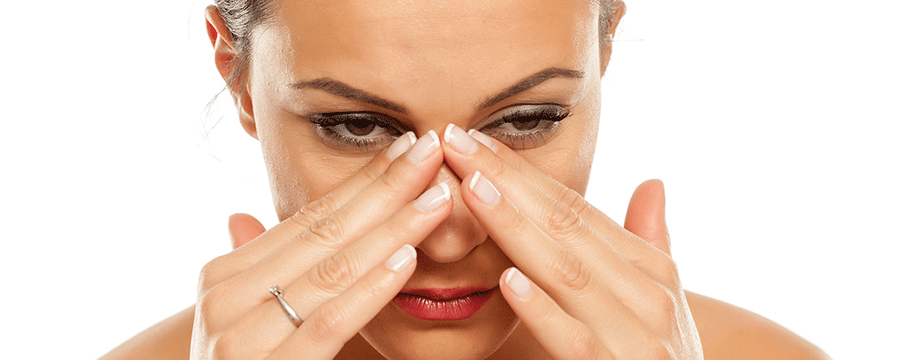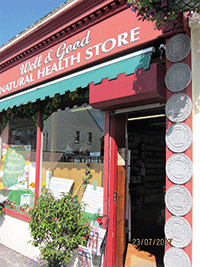Health store help

This issue we speak to Jill Bell, manager of Well and Good in Midleton, Co Cork
Independent health store advice on allergies, hay fever and sinus relief
Sneezes, runny nose, itchy eyes, tickly cough, skin rashes, headaches and congestion – we all know the symptoms, especially the sufferers afflicted in early summer who have an allergy to pollen. Hay fever has struck! But in fact the same symptoms can hit people all year round rather than in the regular pollen season. Clumped together, their symptoms are named allergic rhinitis and can be caused by a wide set of allergens: house dust mites, plug-in air fresheners, plant moulds, animal hair, feathers and perfumes in skincare, to name just a few. In sufferers, the immune system produces antibodies to an allergen which signal the immune system to release chemicals such as histamine, and this is what leads to the dreaded symptoms.
Unfortunately we’ve seen a steady increase in the number of sufferers, especially children. It’s likely that climate change is causing pollen to be released earlier each year, and the huge and increasing number of synthetic chemicals in food and air may also be a factor, but there is no definite cause for the increase.
There are many potential remedies and simple steps which can’t cure but can ease the symptoms and which don’t cause drowsiness or any side-effects.
1 When pollen is an issue, taking a teaspoonful of local honey daily from early in the year can help. This gradually accustoms the body to cope with minute amounts of pollen so that it doesn’t over-react when the pollen season proper hits.
2 Take echinacea as a tablet or tincture. The trick is to start a good month before hay fever symptoms are likely to strike. This can modulate your immune response and make over-reaction less likely.
3 Reishi mushroom is a first class immune modulator, effective for hay fever especially taken a few weeks before the projected onset of symptoms.
4 Reduce your intake of foods high in histamine. There is a long list which includes fermented foods such as kombucha, sauerkraut, yogurt, matured cheese, cured meats (salami, ham), tomatoes, avocados, ready meals, alcohol. Increase your intake of anti-histamine foods such as apples, red onions, fresh vegetables, pineapple and fruits high in vitamin C (except citrus).
5 Try cutting out dairy products which in many people cause over-production of mucous.
6 Stay indoors during the early morning and evening time when pollen rises and falls.
7 Get somebody else to cut the grass!
8 Dry clothes indoors away from pollen and shower at night to remove pollen particles.
9 Splash cold water in your eyes to wash out pollen.
10 Use an organic allergen barrier balm in your nostrils. This helps to trap pollen before it enters the body.
11 Wraparound sunglasses can help, as can keeping windows shut, including car windows, and recycling car air.
12 Tying hair up and wearing a hat prevents pollen being caught in your hair.
13 Using a salt pipe regularly can help clear mucus and reduce inflammation.
All health stores carry a wide range of effective herbal remedies, food supplements and homeopathic medicines, many of which are safe for children to use, and which can help year round whatever the cause of the symptoms.
Nettle is a powerful antihistamine. Children might be persuaded to drink the tea mixed with fruit juice, and adults can take the tincture or capsules. Quercetin is another natural antihistamine, and there are several brands of supplements containing various combinations of quercetin, nettle and vitamin C which have proved very effective. Children as young as four can use an eye spray containing eyebright, also available as a tincture for irritated adult eyes. Most health stores will also stock a herbal tincture safe for children from the age of two, and a range of homeopathic remedies which are as useful and effective for children as adults. Just ask!
Who’s who and what’s what at Well and Good

Well and Good set up in Midleton in 1997, the first health store in east Cork, and though the premises couldn’t be extended, several refits mean that the variety of products stocked has grown exponentially since then, frequently due to customer recommendations. “We listen carefully to our customers”, says manager Jill Bell. “These days customers have often done their own research and will ask us to stock a particular brand they like.”
Membership of the professional trade association, Health Stores Ireland (HSI), has been a key item in Well and Good’s development, enabling staff training to certificate and diploma level as well as fostering media contacts and business development. Jill is involved in administering the HSI Customer Care Protocol which ensures that customer safety and well-being are given top priority.
Jill’s background was as a home baker and market stall holder on Cork’s Coal Quay farmers’ market, so it’s not surprising that her shop specialises in food. As far as possible priority is given to Irish produce such as Con Traas apple juice, Merry Mill gluten free oats, Wilkies chocolate, Kilbeggan oats, Highbank Orchard’s apple syrup and apple cider vinegar, a wide selection of local honeys and Aherns organic raw Jersey milk in returnable glass bottles.
Asking Jill what changes she has seen over the years, she mentions two main trends: the marked increase in medication which means great care must be taken when recommending any herbal remedy or food supplement, and the increase in male shoppers. More recently customer awareness of environmental issues is reflected on the shop shelves with unpackaged shampoo bars and soaps, bamboo toothbrushes, refillable household detergent and shampoo bottles, reusable coffee cups and bees wax food wraps.
What makes the store a success? First and foremost well-trained staff who love their work, two of whom have been with the shop for 18 years. Jill says that no customer ever criticised her for saying she didn’t know something, but would find out and get back with the information. That ethos still holds good in the shop today where learning never stops, and Midleton has an impressive range of practitioners to whom staff can refer customers with issues which are beyond over-the-counter advice or remedies.
Visit: Broderick St, Midleton, Co. Cork
PHONE: 021 463 3499
SPEAK TO: Jill Bell, Gemma Hallissey, Sue Norton, Karen Russell, Noelle Geary and Ditte Friedrich
www.corkhealthstore.com
More Health Store Help articles...
Articles from our latest issue...